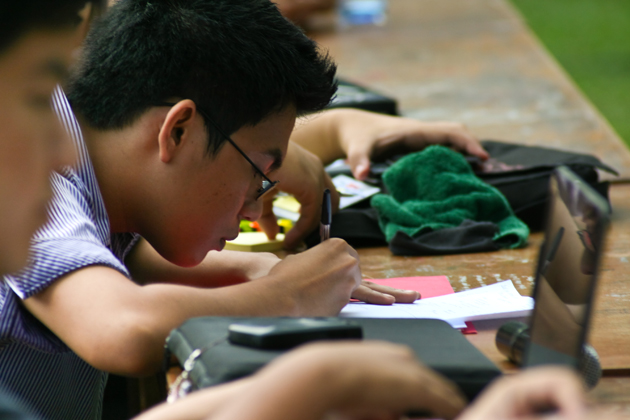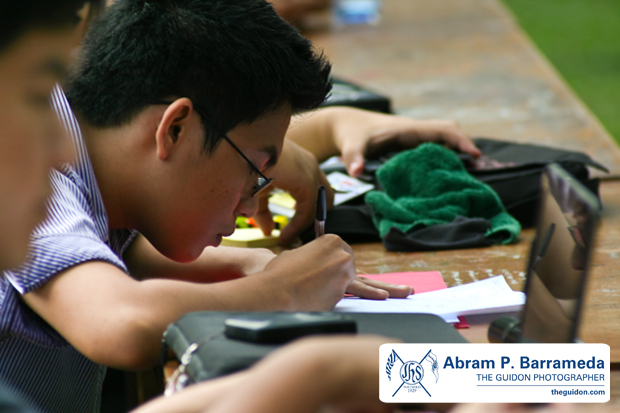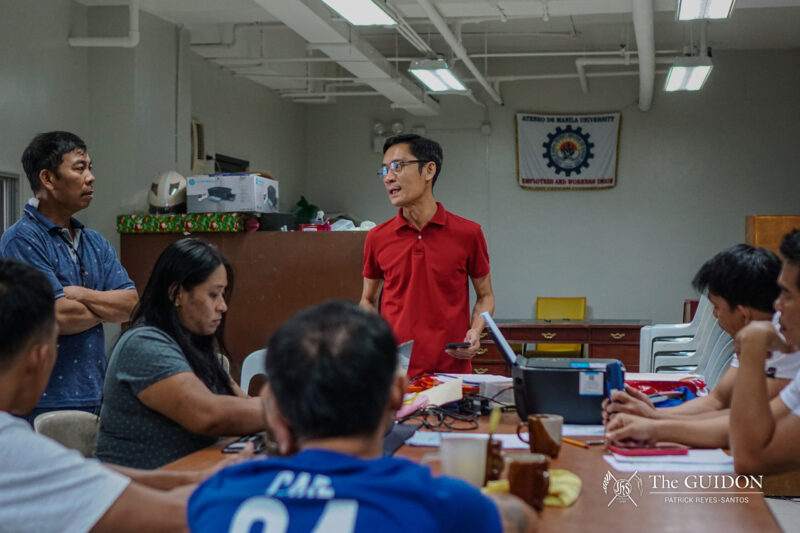POLITICAL SCIENCE organization The Assembly is working towards institutionalizing party politics in the Ateneo this year. By spearheading projects that will empower political parties, the group hopes to make them visible and active the whole year.
The Assembly President Coco Navarro said that this thrust for their projects had already been established since the start of the year, and that there would also be a focus on the 2013 midterm elections.
“I realized, if we can’t fix politics or elections inside the school, what more can we do for actual [national] elections?” she said. “I think we should focus more internally, at least as a [political science] organization. I think it’s our burden to fix campus politics.”
Accordingly, Navarro stressed the importance of the student council. “These are the people who can concretely make changes in terms of policies, in terms of services in the school.”
“So if we are able to improve campus politics, then I think it would be easier to say that we could improve the state of the Ateneo in terms of providing services and having better legislation in terms of policies for the students.”
Improvement at different levels
For senior political science major and Christian Union for Socialist and Democratic Advancement Premier Brian Llamanzares, party politics is a good way for the Atenean to explore the possibilities in college.
“You’re looking at an organization that exists not for business, not for the arts, but rather, trying to involve students in the political processes of our school and of our nation. Basically, you’re training students to be citizens.”
He added that party politics promotes the Atenean’s social responsibility. “[Students] don’t realize that this [Ateneo] is a bubble and once you go past that, the rest of the country is suffering.”
“[Party] politics should ideally take the Ateneans out of their comfort zone and make them realize that you are a leader… and you should act like a leader.”
Navarro believes that by establishing the parties’ identities, they would come up with concrete policies in line with their respective ideologies.
“Definitely, they’ll have platforms that are general, all that ‘transparency,’ ‘representation.’ That doesn’t mean anything to people. For me, it should be clear that when it comes to identity formation among parties, they have specific policies to push for.”
She added that institutionalizing party politics would also result in improvements in the Sanggunian, because the advocacies that parties would push for could also be the things the Sanggunian advocates. Moreover, criticisms could be better driven into action.
“We can say what we want [in The Assembly] but we can’t be the actors who can actually perpetuate change as opposed to parties, because parties would definitely have candidates who can be part of the Sanggunian and who can make actual changes,” Navarro said.
She added that institutionalizing party politics would steer campus politics away from being “personality-based.”
Navarro said, “[Come] elections, you don’t necessarily have to know the candidate, but… under the understanding that since this candidate is part of this party and that you believe in the principles that the party advocates for, then it’s easy for you to vote for the candidate.”
Hyping it up
Several plans have already been outlined in order to institutionalize party politics.
A new office will be established in The Assembly to organize all efforts for reforming campus politics. It will be called the Office of Elections and Political Reform.
“This office will also serve as the organization’s Comelec and [will] spearhead efforts regarding the promotion and assessment of both campus and national elections,” Navarro said.
A month-long campaign to publicize the different student parties and coalitions will also be launched. Atenean participation through pledges will also be lobbied for.
The Assembly is also considering coordinating with the Introduction to Ateneo Culture and Tradition program for the inclusion of an introductory lecture on the Sanggunian and its constitution, as well as an event similar to the Cheer Rally.
“I think something like that should happen for the different parties to get introduced to the freshmen,” Navarro said, adding that it could also work out for the Miting de Avance.
Interparty discourse will also be promoted through the following: policy debates, which will happen when a new policy comes out and needs to be discussed; The Economist debates, an adaptation of the Oxford-style debate on an online forum; and The Assembly Channel, a video podcast with questions focused on particular candidates.
“Good starting point”
Student leaders are generally positive about this direction for The Assembly.
Sanggunian President Gio Alejo welcomed the politicization effort.
He added in a mix of English and Filipino, “Given the many things that… we need to attend to here in Sanggu, I won’t be able to focus on fixing political parties, which I think should be a primary role of The Assembly.”
Llamanzares saw the institutionalization of party politics as a good starting point.
“What The Assembly is trying to do here is create a counterculture which doesn’t exist in the Philippine context, because if you look at the Philippine context, what are political parties used for? They’re used for electoral machinery,” he said.
“[By] trying to build up party politics as a year-long project-building culture wherein… you have candidates working alongside their constituents for a common goal and ideology, you’re creating something that will inevitably change the way people think on a larger, more national scale.”
Alliance of Student Leaders Chairperson Moses Albiento also believes that institutionalizing party politics would be beneficial for both the parties and the students.
“I can see that this will boost the political education of students with what these student political groups are fighting for and, at the same time, allow students to know more about the party that they are inclined to vote for in the elections,” he said in a text message.
However, several concerns were also pointed out. Llamanzares believes that building a strong student base would be a challenge.
“What’s gonna be difficult is changing the mindset of the common Atenean. How many Ateneans today actually care about what’s happening in the political party system?” he said.
“In fact, every Miting de Avance, it’s always just the candidates and their political party mates; [there are] no neutral observers from the student body.”
On the other hand, Movement for Ignatian Initiative and Transformative Empowerment AJ Elicaño said that party politics should continue to grow organically and with a purpose.
Elicaño also expressed a concern, saying, “I don’t want school politics to be so party-focused that independents get marginalized.”
“What I am wary of for any attempt to institutionalize or to promote politics itself… [is] promoting politics for the sake of politics because, like I said, all politics has to come from a multiplicity of ‘somewheres.’ So if all you are promoting is the volume and not the substance, then I think you have a problem there,” he said.








